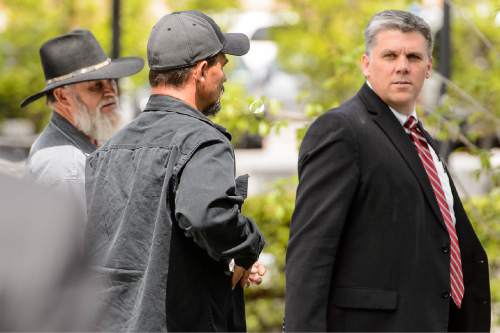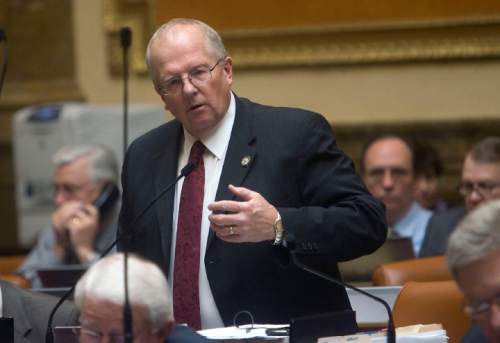This is an archived article that was published on sltrib.com in 2015, and information in the article may be outdated. It is provided only for personal research purposes and may not be reprinted.
A campaign is afoot to shift the cost of San Juan County Commissioner Phil Lyman's legal troubles to Utah taxpayers.
His two commission colleagues passed a resolution last week affirming Lyman's constitutional right to due process after he was convicted for an illegal ATV ride he led into Recapture Canyon last year.
The document — cast as "proof" the county is on board — will enable the Utah Association of Counties (UAC) and Kanab Republican Rep. Mike Noel, a fierce critic of federal control, to ask for funding from the state's Constitutional Defense Council (CDC) to assist in Lyman's appeal.
Commissioner Bruce Adams explained the thinking to Lyman supporters packing a May 19 County Commission meeting in Blanding.
"We do everything we can to support each other. It is difficult for any county commissioner anywhere in the state of Utah to put himself before a wild-eyed judge and unknown jury in a situation where something this important has to be decided," Adams said. "I am sorry we are to this point."
A Blanding accountant with deep roots in San Juan County, Lyman has generated a hefty legal tab fighting federal charges for organizing the May 2014 ride into Recapture, which the Bureau of Land Management had closed to motorized use in 2007 to protect American Indian archaeological sites.
On May 1, a federal jury convicted Lyman and Monte Wells, a blogger who promoted the event, of misdemeanor conspiracy charges. Two other men who rode into the canyon, but played minimal roles organizing the event, were acquitted.
Wells and Lyman are scheduled to be sentenced July 15 and neither has filed a notice of appeal.
The conviction carries a maximum penalty of one year in jail, up to $100,000 in fines and a possible restitution figure exceeding $100,000 to cover alleged damage to the canyon's archaeological sites.
Before trial, Lyman was assigned a federal public defender. But a judge later found he had sufficient resources to cover his own legal costs and told Lyman to hire a lawyer and the public defender's office to send the county commissioner a bill.
San Juan County's resolution supports Lyman's "right to full procedural due process in the courts of law, and to effective legal representation, to determine ... what amount of compensation, fines and other punishment, if any, are just and appropriate."
Before the ride, Adams made it clear that the county was not endorsing the protest and that Lyman was acting as a private individual.
Two former county commissioners, Lynn Stevens and Mark Maryboy, criticized the ride as an illegal gesture that would only set back the county's desire to reopen the canyon just east of Blanding.
Former director of the Utah Public Lands Policy Coordinating Office, a position that oversees the CDC budget, Stevens now questions the legality of investing taxpayer funds in Lyman's defense.
"I know of no provision of Utah law to allow use of these funds to defend a person, acting in either a private or public capacity, accused of a crime," said Stevens, who previously held Lyman's commission seat representing Blanding.
The CDC was created in 1999 to assert the state's jurisdictional interests over federally managed lands. It is funded from a 7.5 percent cut of mineral lease revenue, money that mostly has been devoted to the fight to gain title to thousands of miles of county roads and to transfer 30 million acres of public land to the state.
UAC leaders simply want to file a friend-of-the-court brief should Lyman appeal his conviction to the 10th Circuit, according to Mark Ward, the organization's attorney.
"There is a sense that he was singled out disproportionately because of his position as a commissioner," Ward said. "We won't weigh in on the question of whether he should have been convicted. He was standing up to perceived overreach of the federal government and those overreaches come in various shapes and sizes."
According to Ward and Adams, Noel expects to ask the CDC for funds to "beef up" Lyman's defense. Noel, a council member, did not respond to a request for comment Wednesday.
But another council member, Salt Lake City Democratic Rep. Brian King, said he would closely scrutinize such a request.
"I would be very thorough and very informed before I would cast a vote committing those funds to pay for one individual's legal expenses," King said. "It has to be someone acting under authority of law and in a way that represented the best interests of all the citizens of Utah."
A Kanab Republican whose district stretches over to Blanding, Noel is a central figure in Utah's charge to take control of roads and lands from the federal government.
In 2009, Noel rallied protesters who rode ATVs up the Paria River into a wilderness study area closed to motorized use. Protesters claimed the stream bed is a Kane County road.
BLM employees took photos of the ride and gathered license plate numbers, but charges were never filed.
The feds have taken a different approach toward Recapture, which was closed after federal land managers discovered unauthorized trail construction damaged cultural resources.
Agency managers had cautioned Lyman that illegal riders would face criminal and civil penalties, and Gov. Gary Herbert urged protesters to obey the law.
The legal fallout of the protest ride has become a divisive issue for the county in Utah's southeastern corner, where a majority of the residents are Ute and Navajo.
Since Lyman's conviction, Adams has come under pressure from Lyman's supporters, who say the county should stand up for the embattled commissioner.
At a May 5 commission meeting, Scott Marian, the father of one of the acquitted riders, lectured Adams and others criticized him for not attending Lyman's trial
"The federal government broke the law and the county leaves Phil Lyman to straighten it out," Marian said. "I will pay more taxes if it means wrongs become rights. Most of us are of the opinion you are a man of very little action. It seems to me like you stand on the sidelines with your head in the sand."
Adams has repeatedly told constituents he is frustrated with the BLM's failure to make a timely decision on the Recapture right of way.
"This isn't an issue of me against Phil," Adams said at that meeting. "I chose to fight through the courts, not the protest with Phil. Our insurance company will not pay legal costs or restitution of a county commissioner who is criminally convicted."
The commission voted last year to sue the BLM, but new County Attorney Kendall Laws has yet to file the suit.
Newly elected Commissioner Rebecca Benally spoke up at the meeting, noting she would not have blessed the protest had she been on the commission.
"The place where it was chosen to happen — sacred sites — I don't support that. It's like me taking my ATV and going to someone's cemetery," said Benally, a Navajo who represents the southern part of the county.
"Could you identify on a map where those sacred sites are?" Lyman interrupted, slamming a map down in front of her.
"I'm not done," Bennally said. "For me to interfere like that, where it is a meaningful and spiritual situation and location, I wouldn't support it."
Lyman maintains he was acting on behalf of Blanding-area constituents, long excluded from their own backyards.
"A federal agency, unelected, without political accountability, cannot be given the power to come in and destroy people's lives like they've done in my district," he said, referring to the 2009 arrests of residents who were later convicted of artifacts trafficking. "All we are trying to do is get to the truth of the matter.
"Someone has to do more than just talk about these things."





